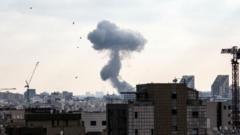Following a coordinated attack involving advanced military tactics, the US has bombed three key Iranian nuclear facilities, leading to global condemnation and concerns about further escalation in the Middle East. Iran's response remains uncertain as international leaders urge restraint.
US Military Strikes Devastate Iranian Nuclear Facilities Amid Escalating Tensions

US Military Strikes Devastate Iranian Nuclear Facilities Amid Escalating Tensions
The US has launched a significant military operation targeting Iranian nuclear sites, resulting in severe damage and increased geopolitical tensions.
The United States has executed a high-stakes military operation dubbed "Operation Midnight Hammer," targeting three critical nuclear sites in Iran—Fordo, Natanz, and Isfahan. This operation, which began with aerial support from 125 military aircraft including B-2 stealth bombers and Tomahawk cruise missiles, has been described by President Trump as a "successful" bombing campaign that has resulted in "extremely severe damage."
The Pentagon is still assessing the full consequences of the strikes. General Dan Caine reported that while the bombings inflicted significant harm on the facilities, early assessments suggest that Iran's nuclear capabilities remain intact as Iranian officials have refuted claims of catastrophic damage, asserting that materials had previously been evacuated.
Fordo, an underground enrichment site essential to Iran's nuclear development ambitions, was the primary target, facilitated by the deployment of "bunker buster" bombs designed to reach deep underground. Caine stated that the air operation included strategic deception tactics, such as decoy flights, to ensure the bombers reached their intended targets without interception.
The immediate aftermath of the strikes saw Iran retaliating by launching missile attacks on Israeli cities, resulting in numerous casualties. Iranian President Masoud Pezeshkian indicated that the US would face consequences for their aggression, emphasizing Iran's readiness for negotiation based on international law.
The political landscape in the US has been polarized following the airstrikes. While some Republican leaders support Trump's action, others, including Congress members, have voiced concerns about bypassing congressional authority regarding military engagement. Critics argue the operation could embroil the US in a broader conflict, exacerbating tensions already present in the region.
As world leaders react, the UK, France, and Germany have called for de-escalation, while UN Secretary-General António Guterres described the strikes as a dangerous escalation of hostilities. Iran's nuclear ambitions have long been a point of contention, with Israel advocating for stringent measures to prevent a potential nuclear threat.
As the situation unfolds, with potential ramifications for international relations and strategic stability, all eyes are on Iran to determine its next course of action amidst the heightened tensions with the US and its allies.























